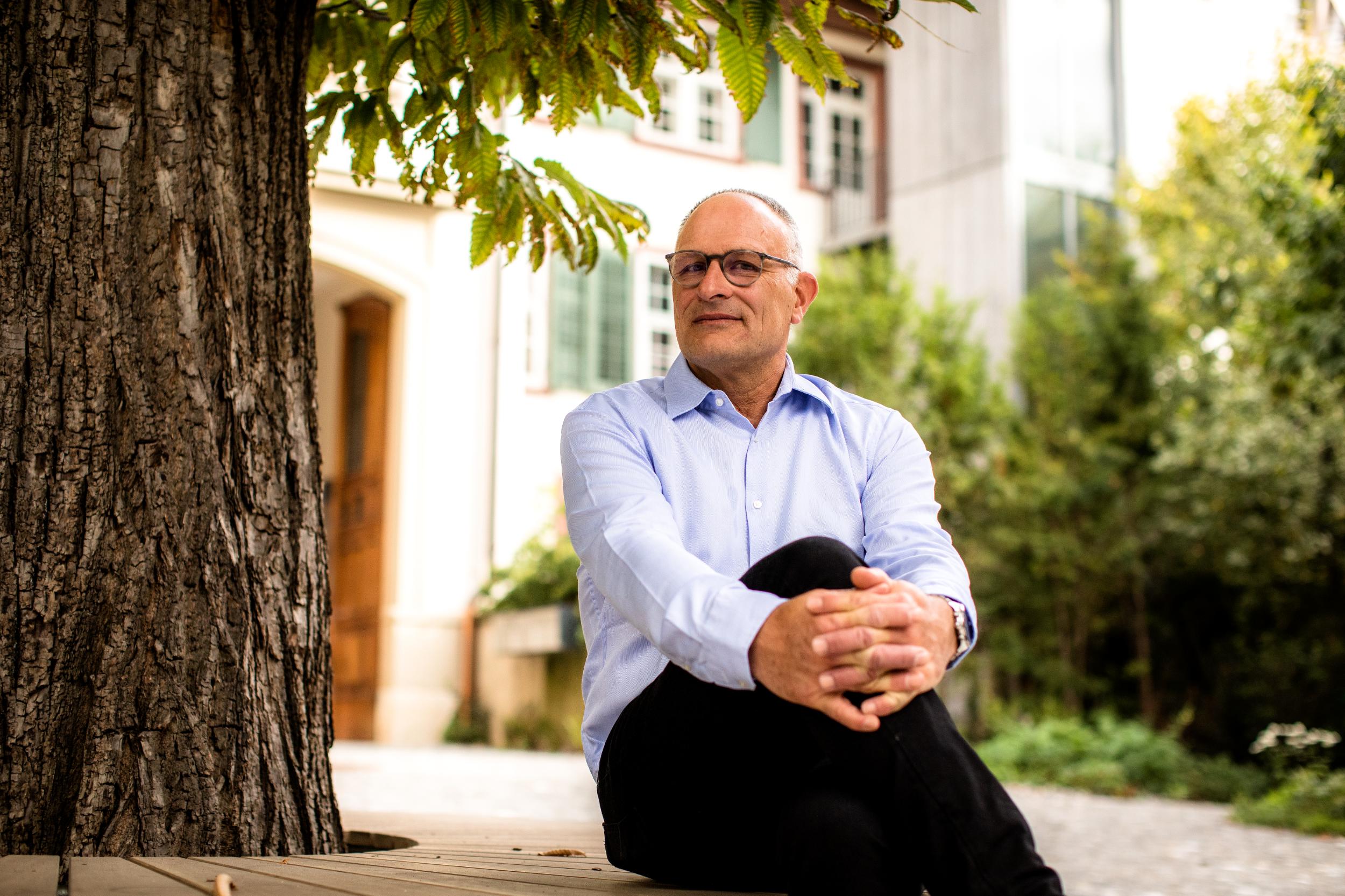The choice to die
Philipp Schenker is a volunteer for EXIT, Switzerland’s largest assisted suicide organisation. According to EXIT, its end-of-life care is characterised above all by empathy – empathy both for the person wishing to die and for that person’s family members. A physician-assisted suicide facilitated by EXIT, says the organisation, will ensure a peaceful, safe and dignified death by enabling the patient to fall asleep in his or her home, in the presence of next of kin, after ingesting the drug Nembutal (pentobarbital sodium).
As Philipp explained in an interview with the newspaper “Basler Zeitung”, various criteria must be fulfilled before an assisted suicide with EXIT can go ahead.
The person must have a serious medical condition. He or she must be capable of forming a sound judgement, and the wish to die must be long-lasting, well considered and independent of third parties. A report is required from the family doctor attesting to the medical condition (often several conditions) and to the person’s sound judgement.
Controversies
Assisted suicide is an emotional topic for very many people. So, it is not surprising that, although assisted suicide has been enshrined in Swiss law for more than 80 years, there have been many areas of controversy.
There are different forms of self-determined death, including active assisted dying and assisted suicide, and practices differ from one country to another.
Active assisted dying is legal in a number of countries but is forbidden in Switzerland. Swiss legislation on active assisted dying is very clear. Active assisted dying, in which a doctor injects a substance leading to death, is forbidden under three articles of the penal code.
The term assisted suicide is used when a person wishing to die is given the means and/or the opportunity to bring about their death themselves. This is legal in Switzerland.
It is permitted subject to specific provisions. Article 115 of the Swiss Penal Code states: “Whoever, for selfish reasons, induces another person to commit suicide or aids him in it, will be punished by imprisonment for up to five years, or by pecuniary penalty.” In other words, although assisted suicide is permitted, people providing such assistance must do so for altruistic reasons.
Are suicide organisations really altruistic, or are they making money from assisted suicide? What about Switzerland’s “suicide tourism”, where people from other countries come to Switzerland to die?
And what about the methods used? Recently, a new spaceship-like contraption called the “Sarco” gave rise to considerable controversy in this country.
Is Swiss legislation on assisted suicide sufficiently rigorous? Are rules needed to cover the conditions under which people can be helped to die? What provisions exist to prevent old people being coerced into suicide due to family pressure?
What about dementia?
And what about people with mental illness or dementia? Can these people be offered support under Swiss law?
The Swiss Federal Supreme court has ruled that suicide assistance may be rendered to people with mental illness (or dementia) only if they understand fully what this means. Such cases are investigated extremely carefully by EXIT, the largest Swiss organisation in this field. EXIT requires two independent expert opinions and the case is then examined by the society’s Ethics Commission.
This means that people with dementia are only eligible for assisted suicides during the early stages of the disease. In the later stages, when they lose their ability to make judgements, they become ineligible.
Altruism
What about the fear that people are making money out of assisted suicide?
Because Swiss legislation explicitly forbids non-altruistic assisted suicide, all suicide assistants are volunteers, and the organisations providing assistance do not earn any money from this activity. In fact, EXIT argues that every assisted suicide costs them money. Funds for the support it provides come from donations and from EXIT membership.
Dignitas is another assisted suicide organisation which accepts applications mainly from people living outside Switzerland. According to its founder, Ludwig Minella, it is also non-altruistic. “Dignitas is not working for profits,” he said in an interview conducted by a US broadcaster some years ago. “We are an association, and associations do not make profit. If we do make any profit, we put it towards ensuring higher quality services and, in particular, to assisting suicide prevention measures.”
Active initiation of death
As active assisted dying is prohibited under Swiss law, the person wishing to die must actively initiate their death by drinking a lethal substance or pressing a button to inject it. EXIT requires that the prescription for the substance come from the person’s doctor. If he or she is not willing to provide a prescription, EXIT has a panel of doctors who can step in.
As EXIT explains, “Having administered the drug, the person will have just enough time to take leave of his or her loved ones. He or she will sink into deep slumber within a few minutes. Death occurs peacefully and painlessly due to a combination of respiratory and cardiac arrest.”
The Swiss police are then notified, as suicide of any kind is deemed to be an “extraordinary death” and may require a so-called “legal inspection”. EXIT reports that autopsies are rarely if ever ordered for its assisted suicides.
EXIT
EXIT was founded well over 40 years ago. Membership is restricted to Swiss citizens and residents and now numbers some 170,000. EXIT provides end-of-life care only to its members.
Each year, over 3500 members apply to EXIT for assisted suicide. The applications are subjected to a strict vetting procedure, and some 1300 are approved. They are supported by 60 trained volunteers, such as Philipp Schenker.
Most volunteers are retired people, who previously worked in fields like nursing, various kinds of therapy or religion. Philipp is an exception in this respect, having been a businessman. “At 60 I took early retirement and looked for an activity I could commit to. I wanted to do something good, give something back to society,” he told the “Basler Zeitung” in an article published in November 2023.
Philipp’s training as an end-of-life supporter lasted a year. In the early weeks and months, he accompanied an experienced supporter. Then he began counselling and supporting people himself, accompanied by a mentor. “You learn by experience,” he explained, “as well as through the many training and supervision sessions which EXIT provides.”
Family pressure
Asked whether there is any danger of old people being pushing into assisted suicide by pressure from families, for instance in cases where care costs have become overwhelming, Philipp’s answer was clear.
“My experience after 50 cases has shown that there is no danger of this kind. In our internal case discussions, we examine the criteria again and again. In my first meeting with the person, they are required to explain why they wish to die. Their reasons have always been totally understandable and clearly expressed.”
Suicide tourism
While EXIT is entirely limited to people living in Switzerland and therefore not so well known outside the country, this is not true of Dignitas.
Switzerland is one of the few countries that permits assisted suicide for non-residents. This has earned the country much publicity, especially when prominent people decide to come here to die. Not all of the publicity has been favourable, and some Swiss question the practice of “suicide tourism”.
The main organisation helping non-Swiss is Dignitas, with 91% of assisted suicides from abroad. Because people must be fit enough to travel to Switzerland, the average age of death for Dignitas is lower than for EXIT – 65 as compared to 77 for EXIT. The proportion with terminal illnesses is also higher.
People wishing to die with Dignitas must become members of the organisation. Their application must be accompanied by medical documents and reports, a CV and an explanation of why they want to die. Interestingly, 70% of people who get the green light to die never call again, according to Ludwig Minelli, the founder of Dignitas. Of the remaining 30%, many die of natural causes before they ever arrive in Zurich.
People who do arrive in Zurich are examined first by a Dignitas doctor who checks whether they fulfil the health-related criteria. Only if the doctor approves the application will the person make his or her way to the Dignitas apartment where they meet the assisted suicide supporter. As with EXIT, they must initiate their death themselves.
Does Switzerland need more legislation?
In addition to the basic requirements of Swiss law, established organisations like EXIT or Dignitas have additional health requirements, as well as rules on inclusion of the person’s close family and friends.
But these do not apply for all non-profit assisted suicide organisations in the country. For instance, an organisation which proclaims on its website that it is the human right of every rational adult of sound mind, regardless of state of health, to choose the manner and timing of their death, operates within the provisions of Swiss legislation.
Applicants to this organisation are not required to submit documentation from any doctor showing evidence of illness. Until recently, the organisation in question did not even require evidence that the applicant’s close relatives had been informed. In 2024, a 47-year old man died without the knowledge of his family. The case attracted considerable publicity. Since then, the rules have been changed and the family must be informed.
Does Swiss legislation on assisted dying need to be reformed? In 2011/2012, the Swiss Federal Council and parliament decided against introducing explicit regulation of organised suicide support. It was argued that abuses could be prevented or revealed under existing legislation.
In 2024, however, another controversy led to demands from a number of individuals in Parliament that suicide support be explicity limited to very ill and dying people. As the Bernese parliamentarian, Marc Jost, put it, “Mentally ill people and young people should not be permitted to apply for suicide support.”
Sarco suicide capsule
The controversy which gave rise to these demands centred on a purple capsule that resembles a spaceship. Its name? “Sarco” – from the word sarcophagus.
The first death in a Sarco capsule occurred in September 2024 in a forest in the northern Swiss canton of Schaffhausen.
According to Wikipedia, the Sarco pod is a euthanasia device or machine consisting of a 3D-printed detachable capsule mounted on a stand that contains a canister of liquid nitrogen to die by suicide through inert gas asphyxiation. Its inventor was Philipp Nitschke, an Australian right-to-die activist, and the Swiss organisation is called “The Last Resort”.
Even before this first suicide, the canton of Schaffhausen had made it clear that anyone involved with the use of the capsule would face prosecution.
Afterwards, Florian Willet, co-president of The Last Resort, spent 70 days in custody. He has since died.
At the time this article was written, the legality of assisted dying with Sarco remained to be clarified.
Photo: EXIT volunteer Philipp Schenker (Fotocredit: Kostas Maros/13Photo)





